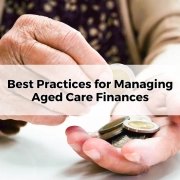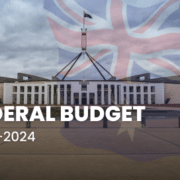Financial Advice for Couples Entering Aged Care Together
Table of Contents
ToggleNavigating aged care can be a complex journey, particularly for couples entering this phase of life together. This unique scenario requires careful consideration of financial, emotional, and logistical factors to ensure both partners receive appropriate care while safeguarding their financial security.
Entering aged care is not just a financial decision but a deeply personal one that impacts families and loved ones. For couples, the stakes are even higher, as decisions made for one partner often affect the other. Tailored advice and thoughtful planning are essential to address their intertwined needs and preferences.
Understanding Aged Care Options
Couples entering aged care have several options available, ranging from residential aged care facilities to in-home care services. Each option comes with distinct costs, benefits, and eligibility criteria.
Residential aged care facilities offer comprehensive care, including accommodation, meals, and medical support. However, they come with significant financial obligations. In-home care services, on the other hand, allow couples to remain in familiar surroundings while receiving tailored support. Understanding these choices and their implications is a vital first step in the planning process.
The Financial Implications of Dual Entry
When both partners transition into aged care simultaneously, the financial implications can be significant. Understanding these impacts early on helps to develop a sustainable financial plan.
Dual entry often means higher combined costs for accommodation, daily fees, and additional services. Couples must consider how their combined assets and income will be assessed and how these assessments will affect their ability to afford care. A proactive approach ensures that both partners’ needs are met without depleting their financial resources.
Centrelink Assessments and Means Testing
Centrelink assessments are pivotal in determining the costs of aged care. Couples need to understand how their combined assets and income will affect their means-tested fees and government entitlements.
The means test evaluates both income and assets to calculate contributions toward care costs. For couples, this process can be particularly complex, as shared ownership of assets and income streams must be carefully evaluated. Engaging a financial adviser can help navigate this process and identify opportunities to optimise entitlements.
The Role of Aged Care Fees and Charges
Aged care costs are multifaceted, including accommodation payments, daily care fees, and additional services fees. Couples must comprehend these expenses to budget effectively.
Accommodation payments can take the form of refundable deposits, daily charges, or a combination of both. Daily care fees cover essential services, while additional fees cater to extra comforts and preferences. Understanding these components helps couples make informed decisions about their care arrangements and manage their finances accordingly.
Strategies to Minimise Aged Care Costs
Through prudent financial planning, couples can explore strategies to reduce costs, such as restructuring assets or leveraging concessional arrangements.
Asset restructuring might involve repositioning investments to reduce assessable assets or utilising certain exemptions under Centrelink rules. Concessional arrangements, such as government subsidies, can also play a role in reducing out-of-pocket expenses. Aged care specialists can provide tailored strategies that align with each couple’s unique circumstances.
Impact on Family Home and Other Assets
The family home holds a special place in aged care planning. Couples must decide whether to retain, sell, or rent their home and understand how it will be assessed under the means test.
For many, the family home represents both a financial asset and an emotional anchor. Retaining the home can offer security and continuity, but it may also limit access to government support. Selling or renting the property introduces different financial and tax considerations. Weighing these options carefully ensures the best outcome for both partners.
Pension Considerations for Couples
Entering aged care can impact pension eligibility and payment rates. Couples need tailored advice to optimise their entitlements while meeting care expenses.
When one or both partners move into aged care, their assets and income are reassessed, potentially affecting their pension payments. Strategies such as reallocation of assets or careful structuring of income streams can help preserve or maximise pension entitlements. Professional advice is crucial in navigating these complexities.
Tax Implications of Aged Care
Aged care decisions often carry tax consequences, including the treatment of rental income, investment returns, and capital gains. Expert guidance ensures compliance and efficiency.
For example, renting out the family home to cover aged care costs can generate taxable income. Similarly, selling assets to fund care may trigger capital gains tax liabilities. Understanding these implications helps couples avoid unexpected tax burdens and maintain financial stability.
Planning for Medical and Lifestyle Needs
Beyond finances, couples must account for medical care requirements, lifestyle preferences, and proximity to family when selecting aged care arrangements.
Medical needs often evolve over time, requiring flexible care solutions. Lifestyle preferences, such as social activities, dining options, and community engagement, also play a critical role in choosing the right facility or service. Balancing these factors with financial considerations ensures a holistic approach to aged care planning.
Estate Planning and Legacy Considerations
Aged care planning intersects with estate planning. Couples should review their wills, powers of attorney, and other legal documents to protect their wishes and legacy.
Entering aged care may necessitate changes to estate plans, including updates to beneficiary designations and enduring powers of attorney. Proper planning ensures that assets are distributed according to the couple’s wishes while minimising potential disputes or complications for their heirs.
The Value of Professional Financial Advice
Seeking guidance from an accredited aged care financial adviser is invaluable. Such experts can tailor strategies to address the unique needs of couples entering aged care together.
An experienced adviser can provide insights into government policies, optimise financial arrangements, and ensure compliance with regulations. Their expertise helps couples navigate this complex journey with confidence, providing peace of mind for both partners and their families.
Conclusion
For couples transitioning into aged care, financial planning is a cornerstone of ensuring comfort, security, and dignity in their later years. By seeking professional advice and carefully considering all aspects of aged care, couples can navigate this journey with confidence and clarity.









